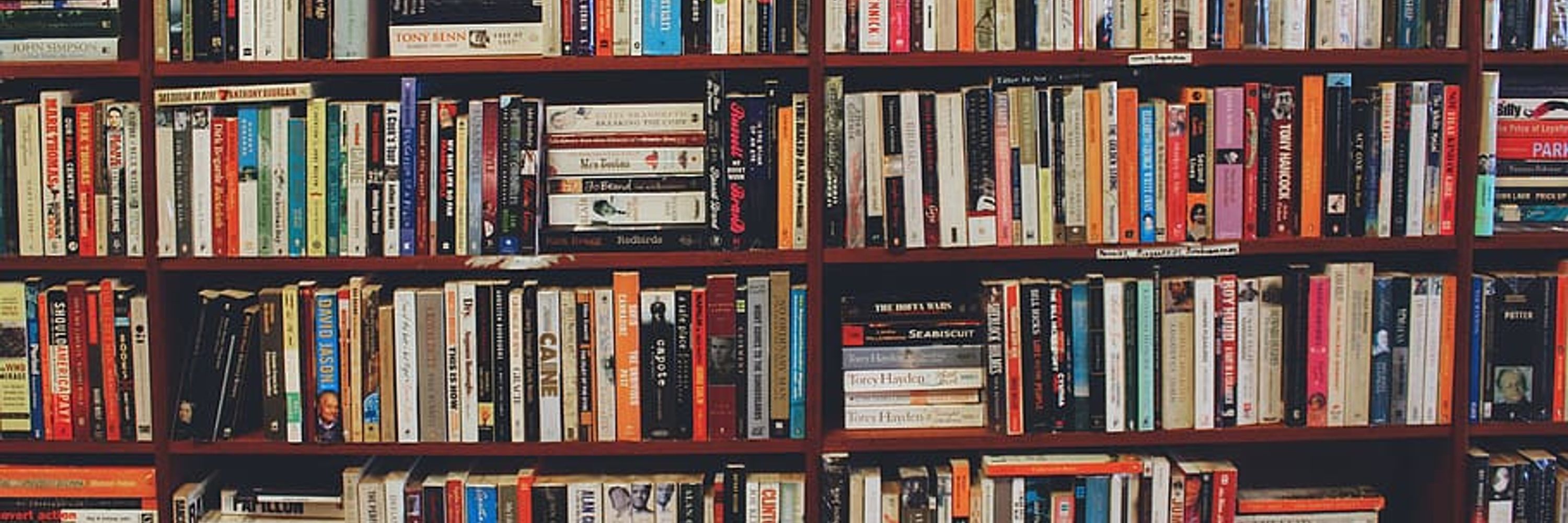
📮 I help creators build a newsletter engine that fuels growth & sales on autopilot.
📧 Join 100K+ readers (free) ⤵️
mikeromaine.com/bluesky
The game has changed. It's harder...
And most won't be up for what it takes.
Keep reading this thread to learn how to win 👇

The game has changed. It's harder...
And most won't be up for what it takes.
Keep reading this thread to learn how to win 👇
My newsletter deep dives fall into deep dives - but I also come in as a thought leader as well.
I give my take on the creators I'm dissecting, talk about the newsletters I have built, and teach my specific methodology.
I also curate the best weekly content for creators.

My newsletter deep dives fall into deep dives - but I also come in as a thought leader as well.
I give my take on the creators I'm dissecting, talk about the newsletters I have built, and teach my specific methodology.
I also curate the best weekly content for creators.
Deep dives and case studies are THE best way to “borrow” authority while building your own.
Each week you send out a deep dive on a specific topic pertaining to your niche, and you slowly become an expert in your market.
And here's my bonus model 👇

Deep dives and case studies are THE best way to “borrow” authority while building your own.
Each week you send out a deep dive on a specific topic pertaining to your niche, and you slowly become an expert in your market.
And here's my bonus model 👇
Creators like Jay and Justin are putting out tons of awesome content to their other content channels (like YT, podcast, etc.)
So along with their core newsletter content, they also use their newsletter to share their other awesome resources.
Here's the final model 👇

Creators like Jay and Justin are putting out tons of awesome content to their other content channels (like YT, podcast, etc.)
So along with their core newsletter content, they also use their newsletter to share their other awesome resources.
Here's the final model 👇
This style of newsletter follows a specific curation structure.
For example, James Clear does:
“3 Ideas From Me, 2 Quotes from Others, 1 Question For You.”
Ready for model 4? 👇

This style of newsletter follows a specific curation structure.
For example, James Clear does:
“3 Ideas From Me, 2 Quotes from Others, 1 Question For You.”
Ready for model 4? 👇
The difference between Thought Leader and Niche Specific is mainly the specificity in the weekly lessons.
While Ben Meer’s content on social is extremely broad, each week we can expect a very specific structure covering a system.
Time for the third model 👇

The difference between Thought Leader and Niche Specific is mainly the specificity in the weekly lessons.
While Ben Meer’s content on social is extremely broad, each week we can expect a very specific structure covering a system.
Time for the third model 👇
With this type of newsletter you are positioning yourself as the expert.
Your content is teaching from your own knowledge and experiences.
Note: This style also allows for a fairly broad range of topics.
Here's the second newsletter model 👇
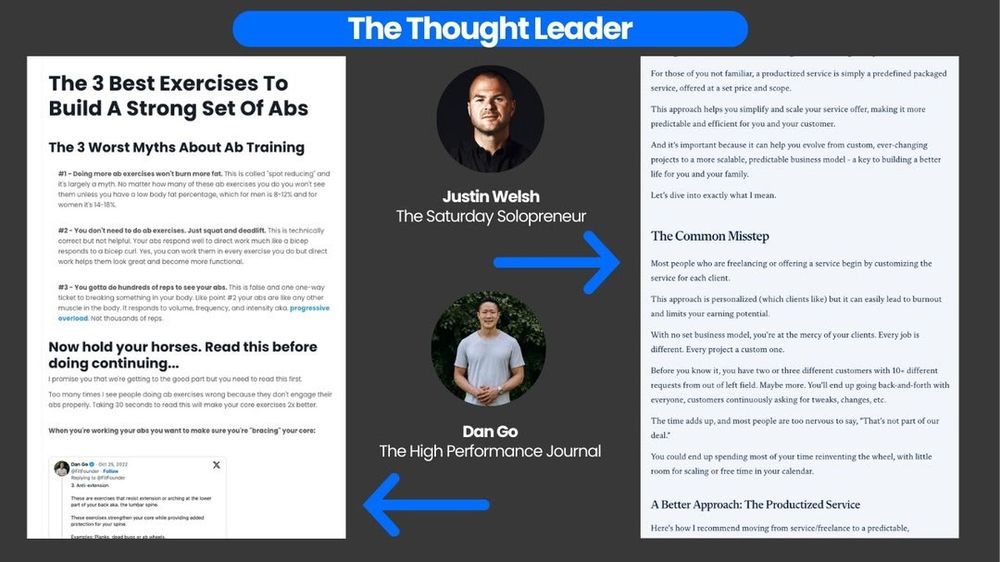
With this type of newsletter you are positioning yourself as the expert.
Your content is teaching from your own knowledge and experiences.
Note: This style also allows for a fairly broad range of topics.
Here's the second newsletter model 👇
"Being busy is a form of laziness."
Here’s his 8-step process to maximize productivity 👇

"Being busy is a form of laziness."
Here’s his 8-step process to maximize productivity 👇
99% of the time I have my newsletter planned well in advance and I'm writing bits of it daily.
BUT...that 1% of the time when I put it off to the last second...

99% of the time I have my newsletter planned well in advance and I'm writing bits of it daily.
BUT...that 1% of the time when I put it off to the last second...
It seems Dickie Bush & Cole found the sweet spot with a 5 Day Crash Course.
Most recently they have begun using 5 day email courses for a few different newsletters they run together.
So consider testing:
1 - No Lead Magnet
2 - Ultimate Guide
3 - 5 Day Crash Course
👇

It seems Dickie Bush & Cole found the sweet spot with a 5 Day Crash Course.
Most recently they have begun using 5 day email courses for a few different newsletters they run together.
So consider testing:
1 - No Lead Magnet
2 - Ultimate Guide
3 - 5 Day Crash Course
👇
They have since converted The 10 Day Crash Course into a 13K word guide.
This is REALLY long for a lead magnet, but their audience is full of readers, so it seems they found it to be successful after testing.
LEAD MAGNET 4 👇

They have since converted The 10 Day Crash Course into a 13K word guide.
This is REALLY long for a lead magnet, but their audience is full of readers, so it seems they found it to be successful after testing.
LEAD MAGNET 4 👇
Dickie Bush and Nicolas Cole are big on email based courses.
They have had TONS of success with these, and have even used this 10 day email course.
(Reference for the next lead mag: This image is from 2021).
Lead Magnet 3 👇

Dickie Bush and Nicolas Cole are big on email based courses.
They have had TONS of success with these, and have even used this 10 day email course.
(Reference for the next lead mag: This image is from 2021).
Lead Magnet 3 👇
Dickie Bush has grown his curation-based newsletter to over 20,000 subscribers without a lead magnet.
Not using a lead magnet can lead to the most engaged readers.
Bonus Note: Justin Welsh has 200K+ subscribers without a lead magnet.
Lead Magnet 2 👇

Dickie Bush has grown his curation-based newsletter to over 20,000 subscribers without a lead magnet.
Not using a lead magnet can lead to the most engaged readers.
Bonus Note: Justin Welsh has 200K+ subscribers without a lead magnet.
Lead Magnet 2 👇
Instead, you'll end up with a list of unengaged freebie seekers.
But Dickie Bush cracked the code and makes $10M a year writing online.
Steal 4 of his top lead magnets 👇

Instead, you'll end up with a list of unengaged freebie seekers.
But Dickie Bush cracked the code and makes $10M a year writing online.
Steal 4 of his top lead magnets 👇
Sub-Text is not necessary, but it’s sometimes a great place to include the final piece(s) of your essentials.
A lot of newsletter creators also use it to say things like “Read for free. Unsubscribe anytime.” and give a final small nudge.
Thanks for reading 👇

Sub-Text is not necessary, but it’s sometimes a great place to include the final piece(s) of your essentials.
A lot of newsletter creators also use it to say things like “Read for free. Unsubscribe anytime.” and give a final small nudge.
Thanks for reading 👇
This part is fairly simple: you need to give your audience a place to share their email.
This should be below your Main Heading and Secondary Heading, but before your Sub-Text.
I personally prefer the proven “Try It”, which gives a gentle nudge.
Let's put the cherry on top 👇
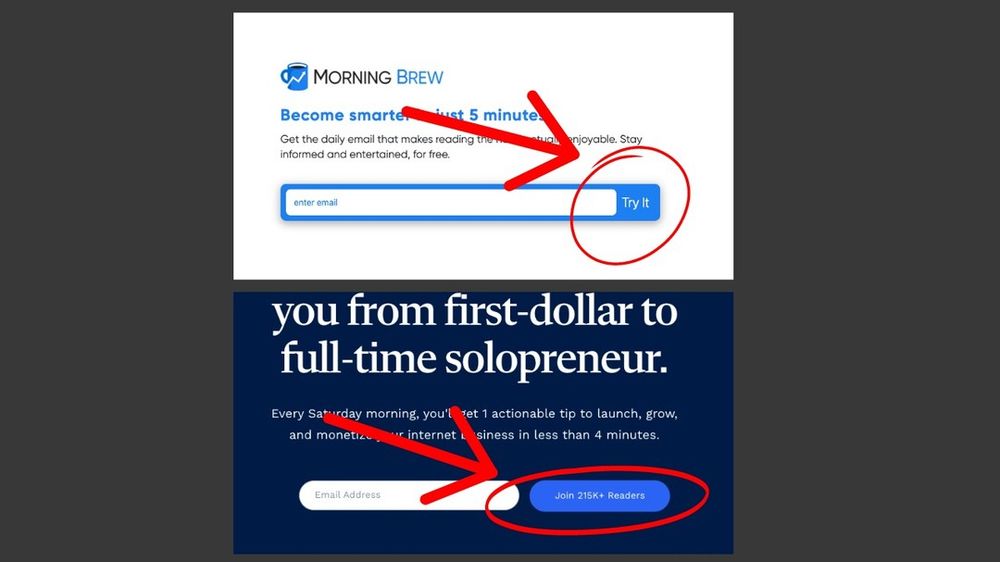
This part is fairly simple: you need to give your audience a place to share their email.
This should be below your Main Heading and Secondary Heading, but before your Sub-Text.
I personally prefer the proven “Try It”, which gives a gentle nudge.
Let's put the cherry on top 👇
Your secondary heading will build on what you do, but also begin sharing the essentials we discussed.
This section doesn’t need to be as short and snappy as your main heading, but you should be able to do it within 2-3 lines, max.
Time for our CTA 👇

Your secondary heading will build on what you do, but also begin sharing the essentials we discussed.
This section doesn’t need to be as short and snappy as your main heading, but you should be able to do it within 2-3 lines, max.
Time for our CTA 👇
Your main heading needs to explain exactly what you do, FOR YOUR AUDIENCE, extremely quickly.
Bonus Examples:
Morning Brew: “Become smarter in just 5 minutes.”
Katelyn Bourgoin: “Discover why people buy so you can market smarter.”
Next up 👇

Your main heading needs to explain exactly what you do, FOR YOUR AUDIENCE, extremely quickly.
Bonus Examples:
Morning Brew: “Become smarter in just 5 minutes.”
Katelyn Bourgoin: “Discover why people buy so you can market smarter.”
Next up 👇
1 - What do you do for your audience (who do you serve)?
2 - How many subscribers will they be joining?
3 - How long will it take to read?
4 - When should they expect it?
And we'll be covering each of these with 4 pieces of our page 👇
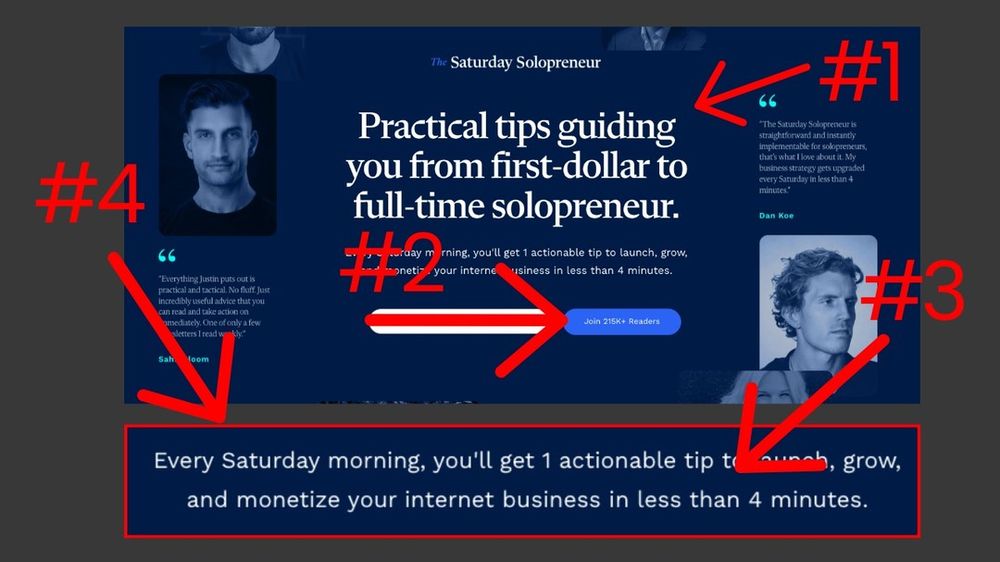
1 - What do you do for your audience (who do you serve)?
2 - How many subscribers will they be joining?
3 - How long will it take to read?
4 - When should they expect it?
And we'll be covering each of these with 4 pieces of our page 👇
1 - Ask for a reply to the email.
2 - Ask to move us to primary.
3 - Provide resources that optimize for a link click.
(All of these things help us stay in their inbox☝️)
4- Tell them what to expect.
But wait, there's a quick 2.5 👇

1 - Ask for a reply to the email.
2 - Ask to move us to primary.
3 - Provide resources that optimize for a link click.
(All of these things help us stay in their inbox☝️)
4- Tell them what to expect.
But wait, there's a quick 2.5 👇
Tell Your Audience:
1 - What they're getting in the newsletter(s).
2 - When they should expect the newsletter each week.
3 - About any emails already coming their way.
4 - Provide immediate value (link to resources).
Onto Step 2 👇
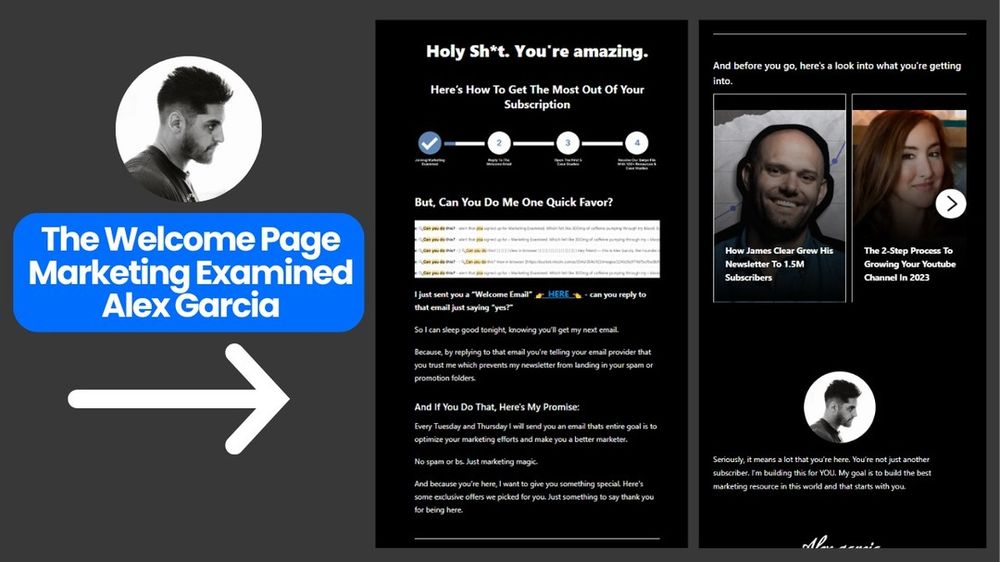
Tell Your Audience:
1 - What they're getting in the newsletter(s).
2 - When they should expect the newsletter each week.
3 - About any emails already coming their way.
4 - Provide immediate value (link to resources).
Onto Step 2 👇
Example: Wall-E
At it's core, Wall-E is a simple love story between two robots, with an environmental message.

Example: Wall-E
At it's core, Wall-E is a simple love story between two robots, with an environmental message.
Example: A Bug’s Life
The circus bugs join Flik’s fight almost miraculously (coincidence), but their success relies on effort, not luck.

Example: A Bug’s Life
The circus bugs join Flik’s fight almost miraculously (coincidence), but their success relies on effort, not luck.
Example: Toy Story 3
The toys face a life or death situation when they face the incinerator. The entire audience feels this because of the stakes!

Example: Toy Story 3
The toys face a life or death situation when they face the incinerator. The entire audience feels this because of the stakes!
Example: Up
Carl’s emotions after losing Ellie is relatable because Pixar captures how anyone would feel after losing the person they loved most.
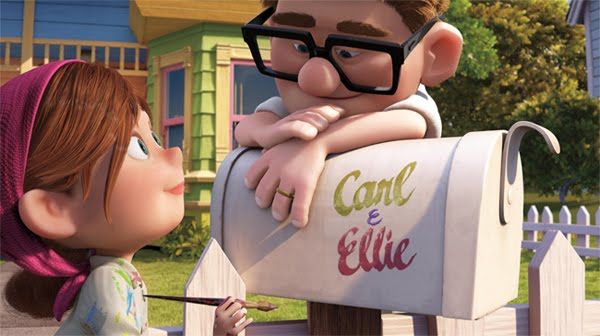
Example: Up
Carl’s emotions after losing Ellie is relatable because Pixar captures how anyone would feel after losing the person they loved most.

